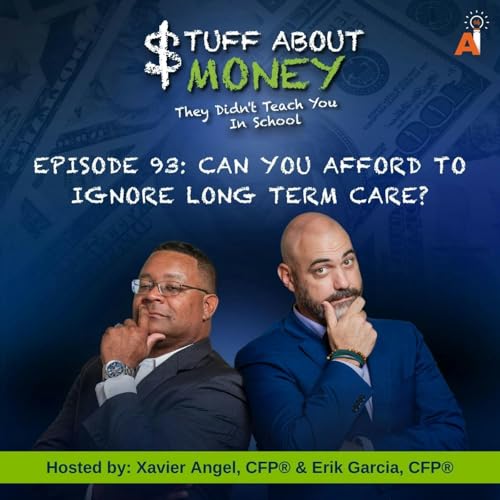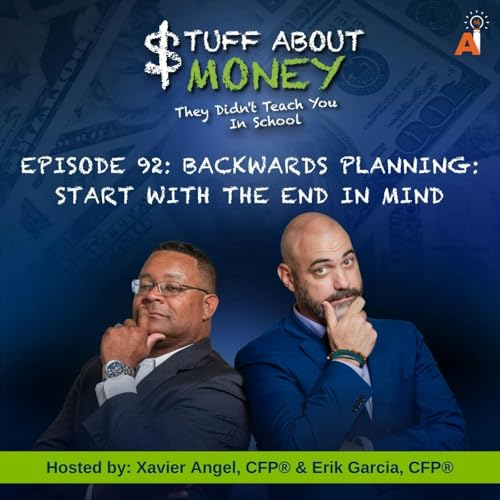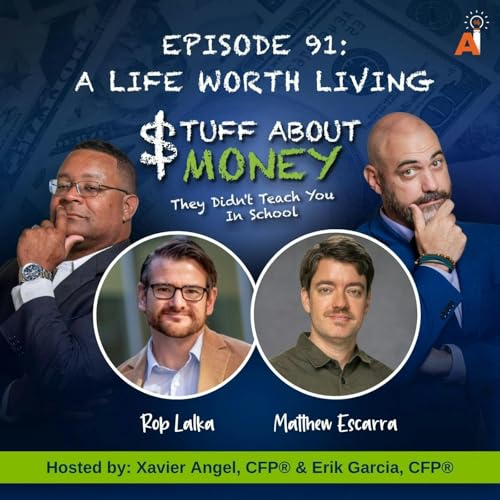In this episode of Stuff About Money They Didn’t Teach You in School, Erik Garcia, CFP®, ChFC®, BFA™, and Xavier Angel, CFP®, ChFC®, CLTC, tackle one of the most important yet often overlooked financial topics: long-term care. The conversation kicks off with a laugh as Erik shares how Xavier nearly got himself kicked out of a professional study group for challenging the conventional wisdom around long term care insurance. That sets the stage for a lively discussion about why this issue matters so much, even if it is not the kind of thing people want to chat about at a cocktail party. Between sobering stats about rising care costs and Xavier’s candid story of his aunt currently in a long term care facility, this episode keeps things engaging while shining a light on a subject that is too often ignored. But ignoring the problem does not make it go away. With the average nursing home room now costing well into six figures annually, long term care planning is a reality everyone needs to address. Erik and Xavier unpack the complexity, explaining why traditional policies may not be as reliable as they seem, why the financial planning around it can be so tricky, and how thinking in terms of cash flow might change the conversation entirely. Along the way, Erik lightens the mood with a surprisingly fitting analogy about chickens and eggs, reminding us that financial planning can be both practical and a little entertaining. Tune in, lean in, and be sure to share this episode with someone who may need a nudge to plan wisely for their future. Episode Highlights: Erik emphasizes why long term care matters, even for younger listeners, due to its inevitable impact on families. (01:12) Erik unpacks the challenges retirees face when fixed incomes meet rising care costs. (03:01) Xavier explains how some advisors buffer rate hikes by quoting higher premiums upfront. (04:00) Xavier shares a personal story to define long-term care as more than just insurance, it’s physical and emotional support. (06:56) Xavier discusses the national costs of care and why planning for it is essential. (11:00) Erik outlines the risks of asset depletion and reduced income after losing a spouse. (13:38) Xavier explains how women statistically need care longer and why planning must consider longevity. (14:18) Erik highlights why long-term care planning must include income replacement strategies. (16:17) Xavier warns against “one-size-fits-all” insurance solutions in client conversations. (17:36) Erik uses a chicken-and-egg analogy to explain sustainable income planning. (21:53) Erik encourages listeners to focus on income streams over lump sums in planning for future care. (24:36) Xavier shares a case study about a client who prioritized legacy over self-care and why that needed to change. (25:39) Erik urges listeners to talk with aging parents now about their long-term care plans. (27:00) Key Quotes: “ As a planner, I'm always thinking about how does this affect you long term, not just today, but what happens 10 years from now? Because if we're doing your planning today, I'm still doing your planning 10 years from now.” - Xavier Angel, CFP®, ChFC®, CLTC “Even though you may not necessarily be taking direct action to solve a potential financial problem today or in the future, having the conversation about it is actually starting to solve the problem.” - Erik Garcia, CFP®, ChFC®, BFA™ “We are financial planners. We love helping people solve financial problems, and we love helping people make financial decisions that are in alignment with what is most important to them.” - Erik Garcia, CFP®, ChFC®, BFA™ Resources Mentioned: Erik Garcia, CFP®, BFA Xavier Angel, CFP®, ChFC, CLTC Plan Wisely Wealth Advisors
Show More
Show Less
 31 mins
31 mins 31 mins
31 mins Sep 9 20251 hr
Sep 9 20251 hr 50 mins
50 mins Aug 12 202548 mins
Aug 12 202548 mins Jul 29 202541 mins
Jul 29 202541 mins 49 mins
49 mins 44 mins
44 mins

